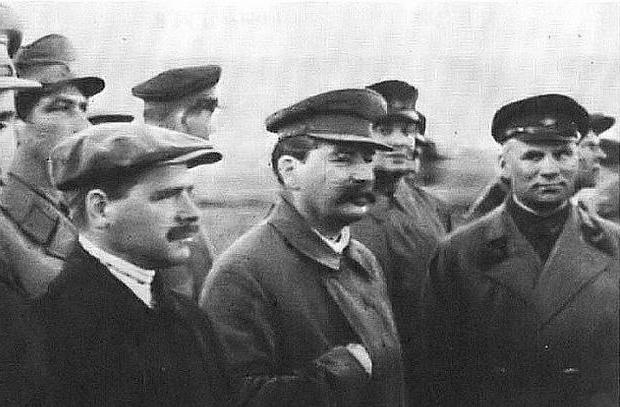Karl Viktorovich Pauker is a man who went down in history as a personal assistant to I.V. Stalin, an indispensable participant in the leader's feasts, his barber, jester and drinking companion, who faithfully served 13 years and repeated the sad fate of most people from the Stalinist circle.
Barber Stalin
A native of the city of Lemberg (now Lviv) of the Austro-Hungarian Empire was born in 1893 and came from a Jewish hairdresser family.
The profession of his father, in whose footsteps Pauker Karl Viktorovich went, was useful to him in the future. In particular, Karl showed his virtuosity by becoming Joseph Stalin's personal barber. It is known that the leader’s face was covered with smallpox, so he often walked poorly shaved. With the light hand of a highly qualified hairdresser Pauker, who at one time served the actors of the Budapest Operetta Theater, the secretary general began to look very neat and well-groomed.
In addition to caring for Stalin's appearance, Pauker fulfilled the slightest desires of his superior, trying to predict them as much as possible. To do this, he thoroughly studied the tastes of Joseph Vissarionovich and took care of his wardrobe.
So, with Paucker's light hand, especially for a leader who was 163 cm tall and wanted to rise above his surroundings, boots of a special cut were sewn: with high heels, partially disguised as backdrops. And so that the shoe trick was not too striking, Pauker ordered the Secretary General a long overcoat that reached his heels.
Also, Pauker Karl Viktorovich (photo - in the article), trying to improve the life of Stalin, took responsibility for his food, strictly controlled the food that appeared on the table. Whether or not Stalin accepts a certain visitor, depended also on Pauker, as well as everything that had to do with the leader and his family.
How did a poorly educated Jew who graduated only from the courses at the Communist University of Ya. M. Sverdlov find himself in such a significant environment and become quite an influential person in the government?
Pauker career takeoff
It all started with army service in the Austro-Hungarian army, from where Karl Pauker was captured by the Russians (in Samarkand), where he stayed until 1917. It was in the prisoner of war camp that he became close to the Bolsheviks, and after a while he joined the party. The years 1917-1918 were marked for Pauker by work in not very high, but responsible positions: as an assistant to the military commissar, assistant to the chairman of the Revolutionary Military Committee (military revolutionary committee), and then the chairman of the field revolutionary tribunal.
Pauker was one of the instigators of the Red Terror in Samarkand and he himself determined the composition of the death lists. Sentence could even for a poor statement in Russian. Such a rapid career rise took place due to the acquaintance with Vyacheslav Menzhinsky, one of the organizers of the Stalinist repressions. Having become something like a “personal servant,” Pauker zealously patronized the chef, and after a while he could no longer do without his assistant. It was from his submission in 1920 that Pauker was transferred to Moscow, in 1922 he took the post of deputy chief of the Operations Division of the Cheka, heading it a year later. This department was in charge of guarding the country's leadership, including Stalin. Karl Viktorovich held this position until 1937.
Karl Pauker - Head of the Stalin Guard
It was under Pauker, of course, with the knowledge of the Secretary General, the number of guards increased many times. If the security of V.I. Lenin was first answered by two, and then four guards, then under Stalin their number increased many times over. For example, along the leader’s route to the summer cottage, there were almost 3 thousand KGB officers properly equipped. Such an escort of a senior person was most reminiscent of a large-scale military operation. Pauker Karl Viktorovich accompanied the Secretary General on all his trips.
Also, the duties of a personal assistant included the possession of information about all the events taking place in Moscow, at the place of which employees of his department should always be present.
Mission of Extreme Importance
Extreme workload did not leave Karl Viktorovich time for his personal life. But Stalin compensated for this with awards (6 orders, including the Order of Lenin) and many gifts, among which there were two cars: a Cadillac limousine and an open Lincoln.

As Stalin's positions strengthened, Pauker Karl Viktorovich began to receive from him tasks of a slightly different nature, often associated with the organization of repressions. Pauker became a kind of personal investigator of the leader of the country, oversaw the arrests and deportation of activists of the “left opposition” to remote Siberian places. Then Karl was entrusted with the case of the Union of Marxist-Leninists, led by Martemian Ryutin, a well-known Bolshevik who openly criticized Stalin's policies. Zealously trying to prove himself (by conducting interrogations, arbitrarily changing the contents of the criminal case file), Pauker, whose participation in the investigation was unlawful, attributed the accused to connections with foreign intelligence and terrorist intentions.
Following the rest ...
Stalin was pleased with the work of Pauker, so he often entrusted him with new tasks, including the Kremlin Case, the case of the Moscow Anti-Soviet Center. Along the way, at the direction of Stalin, who did not trust anyone, Karl Viktorovich himself was taken into development by the party counterintelligence.
On April 19, 1937, Pauker Karl Viktorovich was arrested and charged with preparing an assassination attempt on Stalin. August 14, 1937 - shot. He was not rehabilitated.